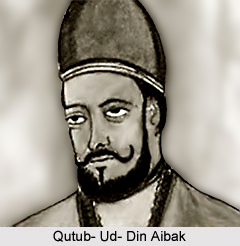 Qutub-Ud-Din Aibak is regarded as the first Turkish Sultan of the Slave dynasty in India. Qutb-Ud-Din Aibak set up the first Muslim state in north India. Mohammed Ghori died in 1206 .Qutub-Ud-Din Aibak had to undergo a brief struggle for power. He succeeded in establishing himself as a ruler of Afghanistan, Pakistan and Northern India. He ruled till the year 1210. Qutub-Ud-Din Aibak is considered as the first Muslim ruler of South Asia.
Qutub-Ud-Din Aibak is regarded as the first Turkish Sultan of the Slave dynasty in India. Qutb-Ud-Din Aibak set up the first Muslim state in north India. Mohammed Ghori died in 1206 .Qutub-Ud-Din Aibak had to undergo a brief struggle for power. He succeeded in establishing himself as a ruler of Afghanistan, Pakistan and Northern India. He ruled till the year 1210. Qutub-Ud-Din Aibak is considered as the first Muslim ruler of South Asia.
Rise of Qutub-Ud-Din Aibak
Qutub-Ud-Din Aibak served as a slave to Sultan Muhammad. Very soon he drew the attention of his master and was given several responsible posts gradually. Qutub-Ud-Din not only helped Muhammad in all his Indian campaigns but also consolidated and extended his conquests whenever Muhammad happened to be away from India. In 1206, Qutub-Ud-Din was formally invested with vice regal powers and promoted to the rank of Malik by Sultan Muhammad. After the death of the sultan, Qutub-Ud-Din reached Lahore and assumed sovereign powers.
Challenges of Qutub-Ud-Din Aibak
Qutub-Ud-Din Aibak had to face many challenges in order to keep his position intact as the ruler of Delhi. He could not depend on the loyalty of all his Turkish officers who could be jealous of his powers and position. The Rajputs were defeated and the sovereignty of north India was snatched away from their hands by the Turks yet they were contesting against the Turks at different places and were sure to take advantage of any and every available weakness of the Turks. The distant provinces which were captured by Turks were not under complete control of Qutub-Ud-Din as was the case with Bengal. Qutub-Ud-Din had no legal claim over the throne of Delhi. He had to win it to ascend the throne of Delhi. He faced all difficulties with determination. He decided to keep himself independent. Then he kept his kingdom free from the political turmoil of Central Asia. However, he moved with caution. He first strengthened his position in Delhi and Lahore. He persuaded most of the Turkish nobles in India to accept his subordination and married his sister to Qabacha and his daughter to Iltutmish. Qutub-Ud-Din was troubled by instable affairs of Bengal and Bihar as well. He could not pursue the policy of extension of his kingdom. He could not pay attention even towards the Rajputs who succeeded in recovering few of their places from the Turks. Mostly he remained busy in defending his independent position and, therefore, the affairs in the north-west and Bengal in the east remained his primary concerns. That is why mostly he remained at, Lahore instead of Delhi.
Qutub-Ud-Din proved the most capable slave among the slaves of Sultan Muhammad. He was a self-made man who rose to the status of Sultan by his own merit and efforts. He possessed the qualities of both the head and the heart. His extreme liberality earned him the title Lakh Buksh (Giver of Lakhs). Qutub-Ud-Din Aibak was diplomatic and possessed practical wisdom. He realised that the infant Turkish kingdom in India was to be separated from the politics of Central Asia and the dominance of Ghaznavid rulers. He succeeded in it and it gave him an independent status and saved him from the anguish of the rising power of Khwarizm Empire. The greatest quality of Qutub-Ud-Din was that he was a seasoned soldier and a military leader par excellence. All modern historians agree that Qutub-Ud-Din was primarily responsible for the success of military campaigns and consolidation of territories of Sultan Mohammad in India. Qutub-Ud-Din`s reign in India laid the strong foundation of Slave dynasty in India






































